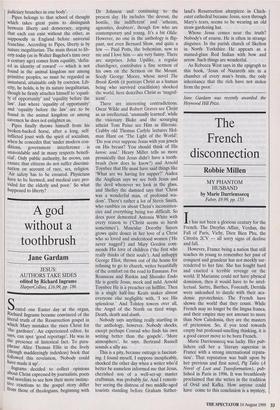A god without a toothbrush
Jane Gardam
JESUS: AUTHORS TAKE SIDES edited by Richard Ingrams HarperCollins, £16.99, pp. 186 Seated one Easter day at the organ, Richard Ingrams became convinced of the literal truth of the Resurrection gospel in which Mary mistakes the risen Christ for the gardener'. An experienced editor, he says, can spot 'good reportage'. He was in the presence of historical fact. To para- phrase Alice Thomas Ellis in the lively (though maddeningly indexless) book that followed this revelation, 'Nobody could have made it up'. Ingrains decided to collect opinions about Christ expressed by journalists, poets and novelists to see how their more instinc- tive reactions to the gospel story differ from those of theologians, beginning with Dr Johnson and continuing to the present day. He includes 'the devout, the hostile, the indifferent' and 'atheists, agnostics, doubters', though few who are contemporary and young. It's a bit Oldie. However, no one in the anthology is flip- pant, not even Bernard Shaw, and quite a few — Paul Potts, the bohemian, new to me and I love him — are very funny. There are surprises. John Updike, a regular churchgoer, contributes a fine sermon of his own on the Sermon on the Mount. Seedy George Moore, whose novel The Brook Kerith (it portrays Christ as a human being who survived crucifixion) shocked the world, here describes Christ as 'magnif- icent'.
There are interesting contradictions. Oscar Wilde and Robert Graves see Christ as an intellectual, 'unusually learned', while the visionary Blake and the scourging atheist Tom Paine see Him as illiterate. Crabby old Thomas Carlyle lectures Hol- man Hunt on 'The Light of the World': `Do you ever suppose Jesus with yon jewels on His breast? You should think of His heroic soul.' Henry Miller tells us more prosaically that Jesus didn't have a tooth- brush (how does he know?) and Arnold Toynbee that He must have said things like `What are we having for supper?' Auden the Anglican says we see both Jesus and the devil whenever we look in the glass, and Shelley the damned says that 'Christ was a wonderful man, of profound wis- dom'. There's rather a lot of Stevie Smith, who rambles on about Christ's inconsisten- cies and everything being too difficult. So does poor demented Antonia White with every reason to (`Christ seems so harsh sometimes'). Muscular Dorothy Sayers grows quite douse in her love of a Christ who so loved and understood women (`He never nagged') and Mary Gordon com- mends His love of children (`the first who really thinks of their souls'). And unhappy George Eliot, thrown out of the house for refusing to go to church, writes beautifully of the comfort on the road to Emmaus. For Rousseau and Ruskin and Shusako Endo He is gentle Jesus, meek and mild. Arnold Toynbee He is a preacher on hellfire. Then in a single half-line Keats makes almost everyone else negligible with, 'I see His splendour.' And Tolstoy towers over all, the Angel of the North on tired wings. Death, death and death.
Nobody says anything really startling in the anthology, however. Nobody shocks, except perhaps Conrad who finds his own writing better than the gospels'. 'More atmosphere', he says. Bertrand Russell sounds a silly ass.
This is a pity, because outrage is fascinat- ing. I found myself, I suppose inexplicably, shocked the other day when a writer who'd better be nameless informed me that Jesus, cherished son of a well-set-up master craftsman, was probably fat. And I remem- ber seeing the distress of two middle-aged tourists standing before Graham Suther- land's Resurrection altarpiece in Chich- ester cathedral because Jesus, seen through Mary's tears, seems to be wearing an old straw gardening hat.
Whose Jesus comes near the truth? Nobody's of course. He is often in strange disguises. In the parish church of Skelton in North Yorkshire He appears as a stained-glass Red Indian with bow and arrow. Such things are wonderful.
As Rebecca West says in the epigraph to this book, 'Jesus of Nazareth sits in a chamber of every man's brain, the only inheritance that the rich have not stolen from the poor.'
Jane Gardam was recently awarded the Heywood Hill Prize.


























































 Previous page
Previous page